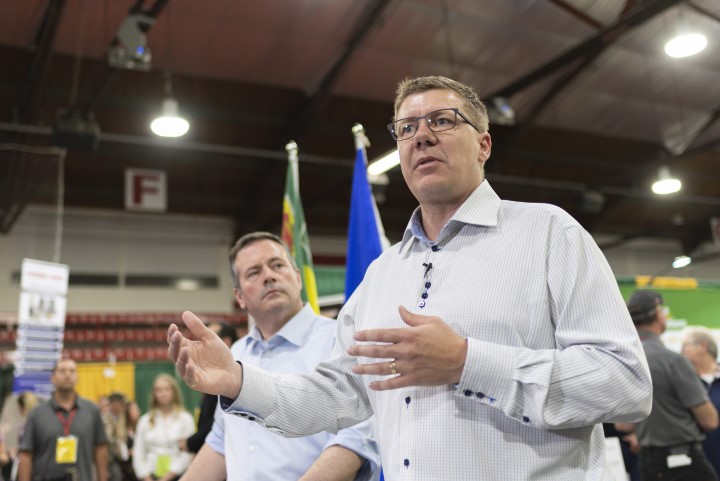This story is part of a special on western alienation. Click here for more coverage.

A group of self-described concerned citizens have been quietly backing the Saskatchewan and Alberta premiers as they seek a new deal for Western Canada.
The Buffalo Project’s members are frustrated federalists that support a unified Canada, but think western provinces aren’t being treated fairly. Members began organizing around the time Brad Wall retired from the Saskatchewan legislature.
“I think a lot of people wanted his sort of common sense approach and solutions to be part of the public sphere for longer,” said Derek Robinson, spokesperson for the group.
In 2018, Wall initially provided advice and strategy for the Buffalo Project, though Robinson said the former premier’s current involvement is as an informal “sounding board” for members.
The 2019 federal election saw Justin Trudeau’s Liberals shut out of Saskatchewan and Alberta. The outcome prompted an intensifying discourse around western alienation.
“There’s lots of people making noise out there. I don’t see a lot of people focused on really important solutions for the long-term vision of this country,” said Robinson.
The Buffalo Project’s name comes from a proposal in the early 1900s that would have made Alberta and Saskatchewan a single province. Liberal Prime Minister Wilfrid Laurier halted the plan and split the provinces into two.
The parallelism, according to the group, is that Saskatchewan and Alberta again have aligned interests and a shared strategy is needed to stand up for the West.
“The equalization formula is a massive problem right now for the West and something needs to be repaired there,” Robinson said.
He identified other potential areas for change including utility transportation corridors and withdrawing from the Canada Pension Plan and employment insurance programs. More autonomy could also be sought in healthcare, police forces and resource management, Robinson said.
Ultimately, the project’s ambitions can be boiled down into a three-pronged strategy:
- Pressuring the federal government for a new deal
- Supporting Alberta and Saskatchewan in seeking more autonomy
- Finding and articulating a “bold new vision” for Canada
Board members include Dallas Howe, Tim Hearn, Grant Fagerheim, Bill Turnbull, Don Chynoweth and Stan Grad. Their areas of expertise include agriculture, construction and real estate, logistics and international relations, potash, along with oil and gas.
The Buffalo Project’s membership size beyond its board is not widely known. Robinson said not every interested person is a formal member.
The group raises money for causes aligning with its interests, though Robinson declined to say how much money has been brought in. All disclosure rules are followed, he said.
“We’re not looking for publicity. We’re wanting to talk to different, various actors behind the scenes to try and solve problems,” Robinson said.
The Buffalo Project has been compared to political action committees (PACs) in the United States, which pool money and donate it to political efforts. The group doesn’t think the terminology fits in the Canadian context.
“You can call it whatever you like. I would call it a concerned citizens group because it’s more than just funnelling money to something,” Robinson said.
Duane Bratt, a political scientist at Mount Royal University, told Global News the Buffalo Project doesn’t seem to function the way politically-motivated corporations, unions or think tanks do.
“If they’re saying it’s just a group of guys getting together every once in a while, what exactly are they doing?” Bratt said.
“Is it just a dinner club? I don’t think so.”
In theory, Bratt said the Buffalo Project could influence election outcomes in the future. He said it could also prove to be a vessel for generating ideas for governing parties in Saskatchewan and Alberta or the federal Conservatives.





Comments